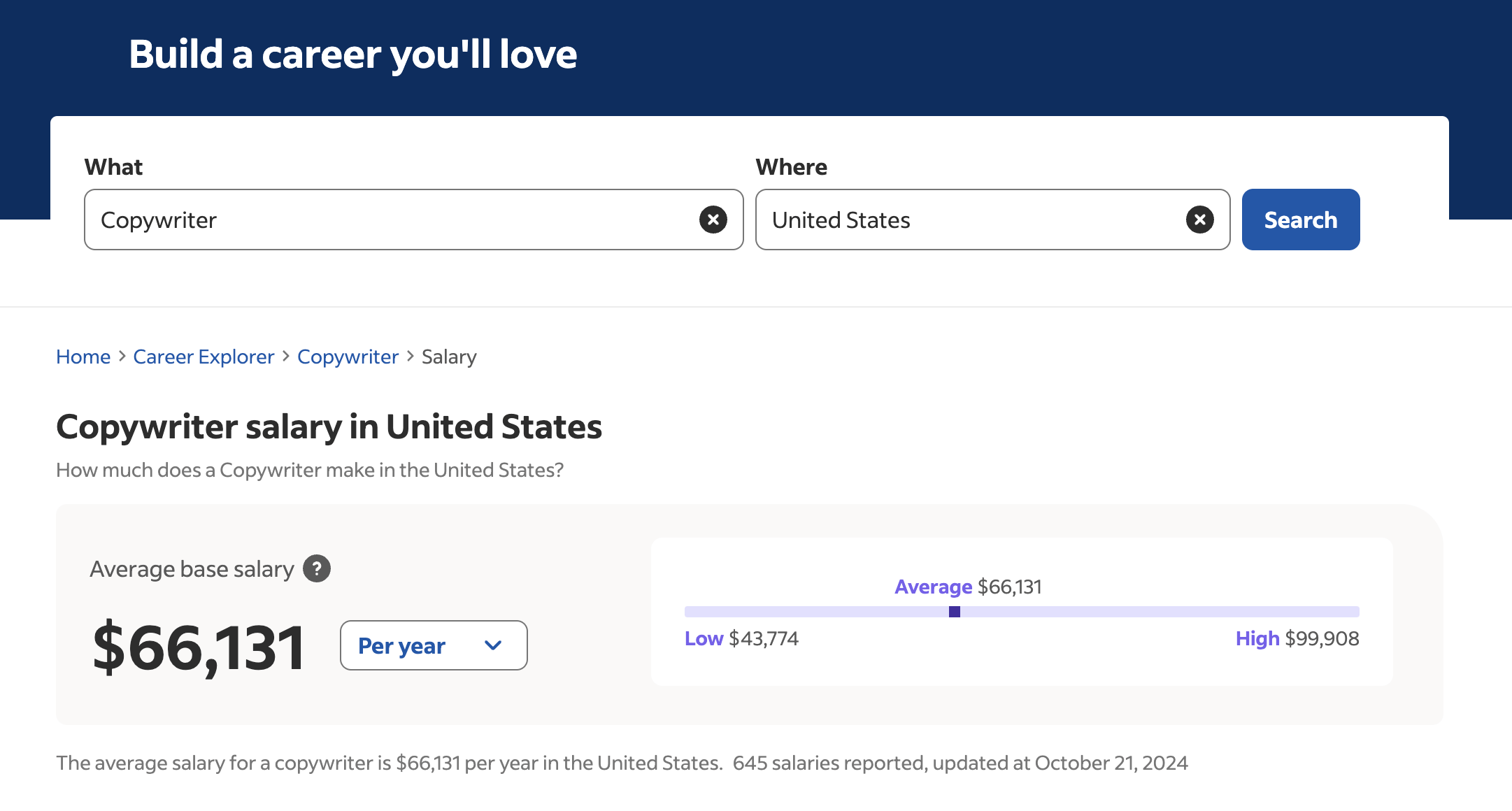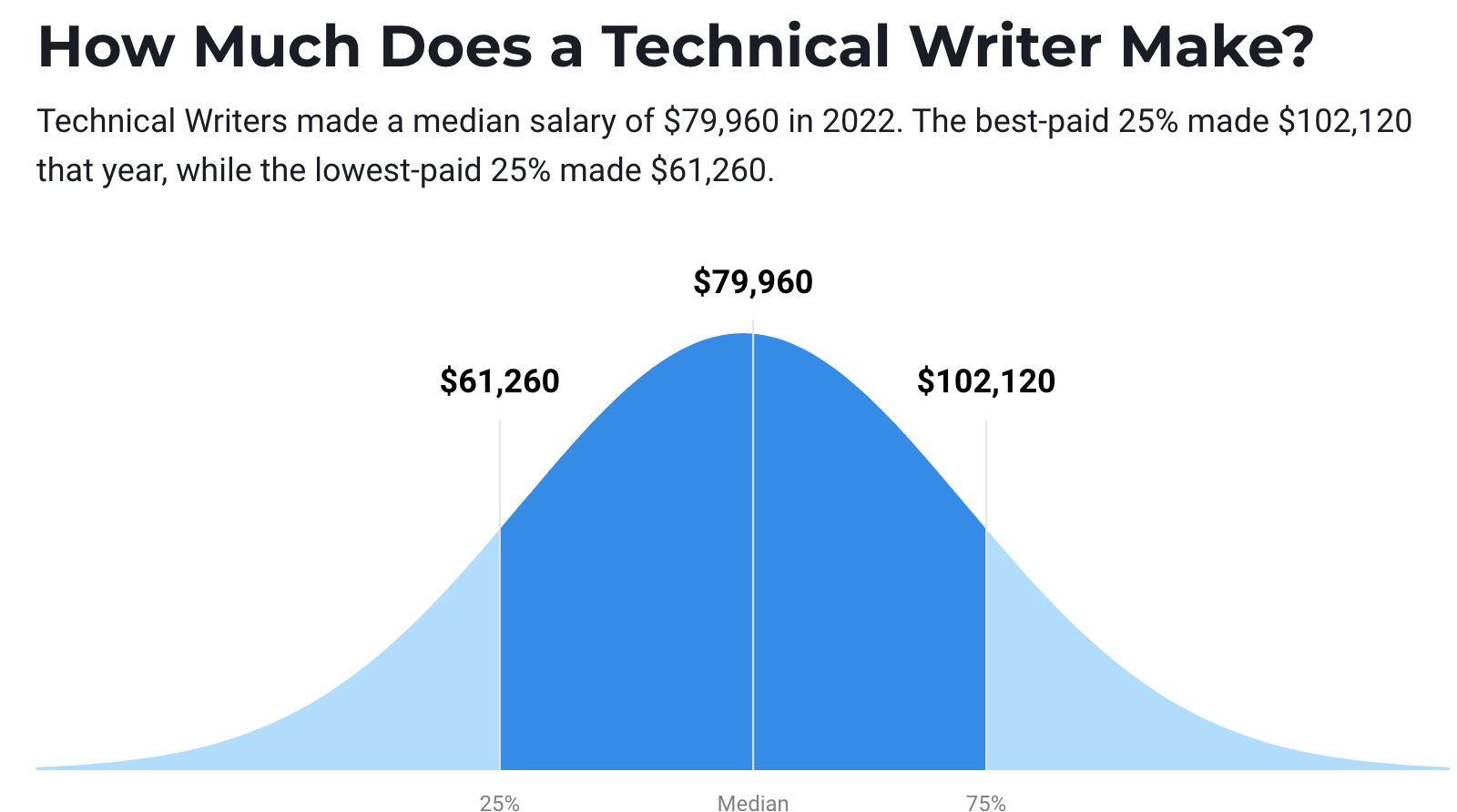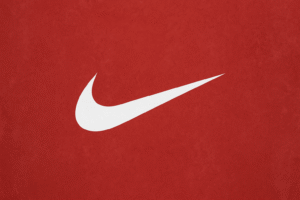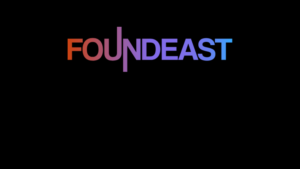When it comes to professional writing, copywriting and technical writing often get lumped together—but they couldn’t be more different. If you’re a business, freelancer, or hiring manager, knowing the distinctions between these two can make or break your project’s success.
Copywriting focuses on persuasion and driving action. Its job is to make people feel something and ultimately lead them to a purchase or sign-up.
Technical writing, on the other hand, is all about clarity, accuracy, and making complex information accessible. You see it in user manuals, product guides, and software documentation.
So whether you’re deciding which career path to pursue or figuring out the type of writer your project needs, knowing when to choose copywriting vs. technical writing will save you time, money, and headaches.
Follow along as I break down the differences between these two forms of writing!
What’s Copywriting?
Copywriting is all about crafting words that drive people to take action—whether that’s clicking a link, signing up for a newsletter, or buying a product.
Every word in copywriting has to serve a purpose, and that purpose is usually tied to sales or conversion. It’s persuasive writing with a clear goal: motivate your reader to act.
And it’s everywhere—think about those catchy Instagram ads, the product descriptions on your favorite e-commerce sites, or even the headlines in an email newsletter. They’re all copywriting, designed to make the reader want something.
The core of copywriting is in the psychology. Great copy isn’t just about putting words together; it’s about understanding what makes people tick. Studies show that emotions drive 95% of purchasing decisions.

So, copywriting taps into that by creating urgency, highlighting benefits, and addressing pain points. It’s less about features and more about what those features mean for the customer.
Take Apple, for instance. They don’t just tell you that an iPhone has a powerful camera. They show you how it will make you a better photographer, capturing moments that matter. That’s copywriting.
What’s Technical Writing?
Technical writing is about making complex information clear and easy to understand, especially for readers who need to use, implement, or troubleshoot a product or process.
It’s not designed to sell or persuade but to inform and guide. Think of manuals, how-to guides, user documentation, or any piece of content that helps a reader perform a task or understand a complex topic step-by-step.
Technical writing requires clarity and structure. The purpose is to take complicated processes or technical jargon and make it digestible. You might see technical writing in the form of a software user guide, a whitepaper, or a product specification document.
For example, a developer manual might break down how to implement code into an app without assuming prior knowledge—just the facts and steps, clear and simple.
Technical writers rely on an organized, logical flow. They use headings, bullet points, numbered steps, and simple language. When it comes to structure, technical writing is often more rigid. Users expect to find information fast, and they’re not there to be entertained—they’re there to get answers.
Main Differences Between Copywriting and Technical Writing
Copywriting and technical writing may seem similar on the surface because they both focus on conveying information, but their goals, audience engagement strategies, and even the language they use are quite different. Understanding these key differences can help you figure out which type is right for your project or career path.
First off, copywriting is all about persuasion. It’s designed to capture attention and inspire action—whether that’s buying a product, signing up for a service, or simply engaging with a brand.
Think of ad slogans, sales pages, email marketing copy, and product descriptions. The goal is to create a desire and show the reader why they need what’s being offered.
Copywriters work closely with marketing teams, brand managers, and sometimes designers to make sure the message aligns with broader marketing goals.
Technical writing, on the other hand, is rooted in clarity and instruction rather than persuasion. The goal here is to provide readers with a straightforward, accurate explanation or set of instructions. It’s often found in user manuals, whitepapers, API documentation, etc.
Technical writers need to be subject-matter experts or at least work closely with them to ensure that every technical detail is correct. The goal is for the reader to easily understand how to use a product or complete a task without any fluff or ambiguity.
Another big difference is the target audience. Copywriting often has to appeal to a broad, sometimes less-knowledgeable audience that needs to be convinced why they should care.
Technical writing, in contrast, is usually directed toward users who already have some level of interest or need—like customers, developers, or internal teams—who need a deeper, more technical understanding of the product.
The tone and structure also diverge. Copywriting is often conversational, engaging, and brand-focused, with strategic use of persuasive language and calls-to-action. Technical writing, however, is formal and structured, often with step-by-step instructions, headings, and lists.
If you’re looking to persuade and connect emotionally, you’re in the world of copywriting. If your goal is to instruct, clarify, and provide users with accurate, detailed information, then technical writing is the right fit.
Skills Needed For Copywriting vs Technical Writing
When it comes to the skills needed, copywriting and technical writing demand different strengths. Here’s the breakdown on what you need for each, so you can hone in on the skills that’ll give you an edge.
Copywriting Skills
- Persuasive Language: Copywriters need to master the art of persuasion. The right words can turn casual readers into committed buyers. You’re not just writing; you’re selling a story, a solution, or a lifestyle. Knowing how to create urgency, inject scarcity, and use power words is essential.
- Audience Understanding: The best copywriters get inside their readers’ heads. It’s about knowing their motivations, pain points, and goals. If you understand your audience deeply, you’ll create copy that resonates and drives action. Use customer personas and data insights to sharpen your message.
- Creativity: Creativity isn’t optional in copywriting. A good copywriter thinks outside the box to craft messages that are fresh and attention-grabbing. Whether it’s a playful headline, a unique angle, or a memorable tagline, creativity makes your writing stick.
- SEO Basics: If you’re writing for the web, knowing SEO is non-negotiable. Keywords, meta descriptions, and search intent should be in your toolkit. Copywriters need to understand the basics of SEO to ensure content ranks and reaches the intended audience organically.
- Testing and Optimization: Writing copy is only half the battle; testing is where the magic happens. Copywriters should be comfortable A/B testing headlines, calls to action, and messaging to see what converts best. Analyzing metrics and using data to optimize content is a big part of successful copywriting.
Technical Writing Skills
- Technical Knowledge or Research Skills: To explain complex topics, you either need firsthand knowledge or the ability to research and understand technical details. Many technical writers work in specialized fields, like software, engineering, or healthcare, where accuracy is critical. Knowing how to break down complex information is essential.
- Clarity and Conciseness: The ability to write clearly and concisely is non-negotiable in technical writing. There’s no room for fluff; every word counts. A technical writer’s goal is to make sure the information is easy to understand on the first read, especially for instructions or procedures.
- Structured Thinking: Technical writing often follows a very logical flow. You need to be able to organize information into clear sections and steps. Structured thinking helps in creating user manuals, whitepapers, and documentation that guides the reader seamlessly from start to finish.
- Style Guide Knowledge: Unlike copywriters who play around with tone, technical writers stick to specific guidelines. Familiarity with style guides like AP, Microsoft Manual of Style, or your organization’s internal guide ensures consistency and professionalism.
- Attention to Detail: Even a small error in technical writing can lead to misinterpretation or misuse. This is especially critical in fields where accuracy can impact user safety, financial decisions, or project outcomes. Technical writers need to be detail-oriented and meticulous with facts, figures, and formatting.
Both copywriters and technical writers need strong language skills and the ability to adapt their tone to the audience. But the way they use those skills differs vastly, and understanding these differences can help you decide which path is better suited for your strengths and interests.
Choosing The Right Career Path
Choosing between copywriting and technical writing can be daunting. Both have unique opportunities, but they also appeal to different mindsets and goals. Here’s my take on these two career paths.
Copywriting as a Career Path
Copywriting offers tons of flexibility, creativity, and even high earning potential. Copywriters work in a broad range of industries, from fashion to finance. You might write ads, social media content, landing pages, emails, or entire brand messaging frameworks. This path is ideal if you thrive on creativity, persuasion, and love getting into the psychology behind buying decisions.
According to Indeed, the average salary for a copywriter in the U.S. is around $66,131 per year, but top-tier copywriters can earn six figures, especially those working in specialized niches like finance or SaaS.

Freelancing is common in this field, and it’s possible to build your own client list and set your rates as you gain experience and prove results. With the growth of digital marketing, copywriting opportunities are booming, and if you’re good at it, there’s no shortage of work.
Who this is for: If you’re looking for a flexible career with high income potential, a focus on creativity, and the chance to work directly on revenue-driving projects, copywriting is a great path. It’s also for those who don’t mind continually evolving their skills, as trends in consumer behavior and digital marketing shift constantly.
Technical Writing as a Career Path
Technical writing is less flashy but highly in-demand, especially in industries that produce complex products, like tech, engineering, or healthcare. Technical writers create user manuals, product guides, whitepapers, and other content that helps users understand how products work.
The role is essential in industries where clear instructions can be the difference between a successful product and a confused customer base. This path is perfect if you have a knack for clarity, enjoy working with technical information, and prefer structure over creative freedom.
US News reports that the median salary for technical writers is around $79,960 per year, and it can go higher with specialization and experience.

This field often offers stable, full-time roles, although freelance technical writing is also an option. Technical writers may find opportunities in large corporations, government agencies, or as part of a specialized content team within a tech company.
Who this is for: If you value stability, clarity, and don’t mind diving into complex topics, technical writing could be the right path. It’s especially fitting for those with expertise in technical fields or a background in areas like software development, engineering, or science.
Key Differences in Career Development
One of the main distinctions is in career progression. Copywriters often start with generalist roles and then specialize as they find niches they’re passionate about, like email marketing, social media, or direct-response copy.
Technical writers, on the other hand, might move into specialized technical fields, focusing on software documentation or regulatory materials, or they may take on project management roles within documentation teams.
Flexibility vs. Stability: Copywriting tends to offer more freelancing opportunities, while technical writing leans toward full-time roles. However, both paths offer a chance for remote work.
Copywriting often has a performance-based component, especially if you’re freelancing, which means income can fluctuate. Technical writing usually provides steady, salaried income, appealing to those who prioritize stability.
Which Path Should You Choose?
Choosing between copywriting and technical writing isn’t just about what you think you can write well—it’s about what you enjoy writing, the kind of work environment you want, and how much stability or creativity you’re after in your career. Let’s break down how to decide which path might suit you best.
Think About What You Enjoy Writing
Ask yourself what type of content you naturally gravitate toward. Do you enjoy crafting persuasive messages that drive people to take action? Copywriting might be your fit. It’s all about selling ideas, shaping opinions, and speaking to customer desires in a compelling way.
Oppositely, if you’re drawn to teaching through clarity, explaining technical details, or writing in structured formats that simplify complex information, technical writing could be your calling.
Example: Take a look at the type of websites and content you enjoy reading. If it’s product descriptions, ads, and sales emails, you might enjoy copywriting. But if you’re fascinated by “How It Works” guides, user manuals, and in-depth instructional content, technical writing might be the way to go.
Assess Your Comfort With Deadlines and Project-Based Work
Copywriting often operates under tight deadlines. Clients expect quick turnarounds, and the work may shift rapidly, especially in marketing agencies. If you thrive under pressure and enjoy a fast-paced environment, this could be a positive fit.
Technical writing is typically more consistent in terms of timelines. You’re creating thorough documentation that requires careful research, editing, and collaboration with developers or engineers, which may allow for a more predictable schedule.
Example: If the idea of frequent deadlines and flexibility excites you, copywriting has that in spades. If you prefer project-based work where you can dive deep into details, technical writing will offer you that steadiness.
Evaluate Your Income Priorities
Both careers can be lucrative, but they differ in earning potential based on experience and skill level.
Copywriting has a wide range—junior copywriters might earn around $50,000 a year, while experienced copywriters with a niche or specialty can pull in six figures or more, especially freelancers.
Technical writers have a solid average salary too, usually around $70,000 to $80,000 a year for full-time roles, according to the Bureau of Labor Statistics, and can go higher with specialized skills in industries like tech or pharmaceuticals.
Example: If you want the potential to quickly increase your rates as you gain more clients, copywriting allows for that flexibility. Technical writing, however, provides a consistent, stable income, which might appeal if you’re looking for long-term stability.
Consider Your Preference for Creative Freedom vs. Structure
One of the biggest distinctions is creative freedom. Copywriting lets you experiment with tone, messaging, and style to appeal to your target audience. It’s about crafting unique and engaging narratives.
Technical writing is more structured, fact-focused, and uniform, with little room for creative flair. You’re explaining products and processes, so clarity takes precedence over creativity.
Example: If you’d rather work with marketing teams to test out catchy headlines or persuasive phrases, copywriting is your answer. But if you find satisfaction in making complex details easy to understand, technical writing will be rewarding.
Try Out Both
One of the best ways to decide is to try them both. Start with small freelance projects, perhaps on a site like Upwork or Fiverr. Take on a copywriting gig, maybe crafting a landing page or a sales email. Then, look for a technical writing project, like writing product instructions or a short user manual.
Final Thoughts on Copywriting vs Technical Writing
If you’re a natural storyteller who loves the psychology of sales and wants room for creativity, copywriting might be where you shine. But if you have a knack for organizing information, a love for detail, and want work that’s consistent, technical writing is likely a better fit.
Here’s the real takeaway, though: both paths are rewarding, but the choice depends on whether you want to engage and persuade or clarify and inform. Each offers different kinds of satisfaction.
Whichever one you choose, dive into it with a commitment to mastering the craft—because whether you’re writing a compelling sales page or a software manual, excellence pays off.
Schedule a free consultation to learn more about my marketing services that will help your business drive more revenue.














